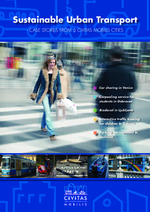Linking car sharing to public transport services
Summary
As an innovative approach to car ownership, a car-sharing scheme was tested in Toulouse to assess its potential integration with the city’s public transport system.
Implementing sustainable mobility
Longer distances and travel times have contributed to the large-scale use of the private car, in particular within and around large urban areas. Car sharing is one alternative to private car use in large cities. It involves setting up a fleet of vehicles that can be reserved for different lengths of time. This service enables users, most of whom live in the city, to obtain a vehicle on demand, without paying ownership costs. It also guides them towards more sustainable transport modes.
Car sharing has been encouraged in France since the late 1990s. In 1998, Wallgreen Company introduced its own experimental car-sharing organising, but lack of promotion was a limiting factor and the test stopped. Prior to the CIVITAS measure, there was no car sharing in Toulouse, thus the measure was designed to analyse the potential for such a service and the potential barriers to its development.
The measure also provided an opportunity to test an integrated multimodal service, combining car sharing, public transportation and other transports modes, with the same sustainable objective of achieving a modal shift away from the private car.
Progress
Between August and December 2008, the public transport authority Tisseo carried out a feasibility study on the implementation of a car-sharing service in Toulouse. The study analysed the overall context for the development of the service and the integration of marketing aspects in order to identify potential car-sharing users.
The study revealed a low level of awareness among the public, and also among politicians and decision makers. A number of scenarios were developed at conurbation level, the selected one aiming to implement 11 stations with two vehicles each in the city centre. This would be gradually expanded to 40 to 50 vehicles and 2,000 subscribers after five years.
In the meantime, a local non-profit organisation had set up its own car-sharing service, MOBILIB, which local CIVITAS partners, including Tisseo, decided to support. MOBILIB was launched in 2009 with 11 vehicles at six stations in the city.
Outcomes
The realisation of the feasibility and marketing study took more time than initially foreseen, which led to a delay in the launch of the car-sharing scheme. As a consequence, no specific results regarding the use of the car-sharing service were available during the MOBILIS project. The integration of the car-sharing service with public transportation and other modes remained to be achieved after the completion of the CIVITAS measure.









